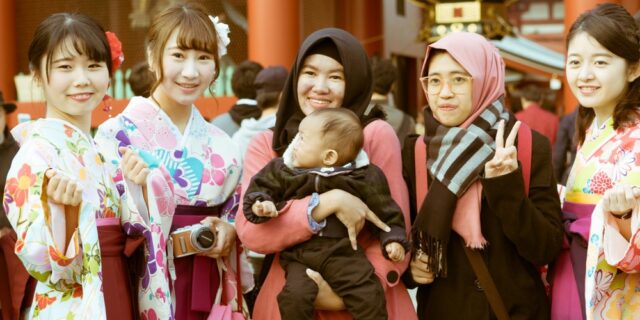Halal tourism is on the increase in Japan

Japan continues to enhance its hospitality for Muslim travelers to the country.
Tourism numbers to Japan are rising year-on-year. One segment experiencing phenomenal growth is halal travel or halal tourism, tourism targeting Muslim travelers who abide by the rules of Islam.
This is partly because citizens of South East Asian Muslim countries such as Indonesia, Malaysia, and Singapore are generally exempt from obtaining visas if they hold an ePassport in compliance with ICAO standards.The majority of Muslim visitors to Japan are from these countries. Other reasons for a boost in halal travel in Japan include an increase in Muslim-friendly and halal-accredited restaurants and facilities, mosques and tours.
Japan is typically tolerant of different religions and becoming more attuned to the needs of Muslim visitors. Muslim travelers should be aware, however, there is no central agency for halal accreditation. That said, many Muslim-friendly resources exist. These include: the Japan Welcome Guide for Muslim Travelers , Japan Guide for Muslim Visitors , Halal Gourmet Japan , Halal Media Japan and HalalJapan.jp .
Are there Muslim-friendly hotels in Japan?
An increasing number of hotels in Japan offer facilities and services for Muslim visitors. These range from halal restaurants, to prayer mats and Mecca-facing spaces in individual rooms or common areas. Sometimes, concierge staff are knowledgeable about local halal restaurants and mosques. Most of these services and facilities are in major cities.
Alternative accommodations such as rental apartments, or hotel suites with all-inclusive kitchenettes, are further Muslim-friendly options for travelers wanting more reassurance over the preparation of halal meals.
Can I get halal food in Japan?
For Muslim visitors traveling to Japan, halal-certified groceries and food products in Japan refer to (mostly frozen) meat, spices and other singular products as opposed to ready-to-eat-meals. The average supermarket does not stock halal products, but some so-called “”ethnic”” grocery stores have prepared Indian or other halal curry meals.
Will Japanese restaurants cater to my needs?
At first glance, Japanese cuisine seems halal-friendly as rice, seafood, plant foods and soybean products such as tofu comprise a large part of the traditional diet. However, cooking sake and a sweetened rice cooking wine known as mirin, along with soy sauce, form the basis of many widely-used Japanese seasonings such as mentsuyu, a common noodle broth. Such alcohol can also be found in some kinds of miso unless it is additive-free and labeled ‘mu-ten-ka’ (無添加). Gelatin and animal fats such as butter may also be present in breads, snacks, and sweets.
While some restaurants call themselves halal-friendly, food may not be prepared in a separate halal-only kitchen. Also, be aware that alcohol is served in the majority of Japanese restaurants. Muslims in search of eateries serving halal-certified food are best advised to consult a local restaurant guide catering specifically to Muslim visitors.
Where are Muslim prayer rooms and mosques in Japan?
Prayer rooms and mosques are mostly found in Japan’s larger cities. Most major airports, tourist hotspots and Muslim-friendly hotels are increasingly offering designated spaces for Muslims to pray.
Are there any halal tours catering to Muslim tourists?
A popular and stress-free way for Muslim visitors to travel within Japan is by joining a halal-friendly tour. Such tours typically allow members to see Japan’s most famous sightseeing spots, guide them to reliable halal-friendly restaurants and schedule time for visiting mosques and saying prayer.
